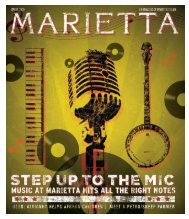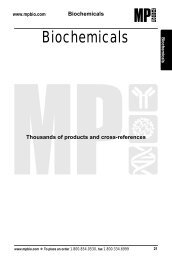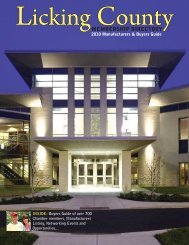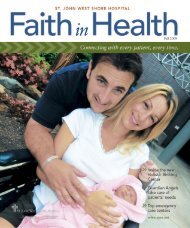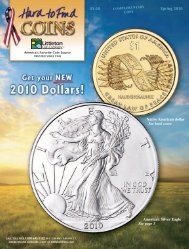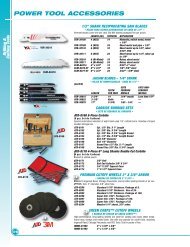CULTURAL CHANGE - FlipSeek, Inc
CULTURAL CHANGE - FlipSeek, Inc
CULTURAL CHANGE - FlipSeek, Inc
You also want an ePaper? Increase the reach of your titles
YUMPU automatically turns print PDFs into web optimized ePapers that Google loves.
A highlight of the trip was when Marietta’s chorus was<br />
the first American college choir to perform during the All<br />
China Choral Directors Seminar. The climactic event of<br />
the journey, though, was a reception attended by some<br />
influential officials in China, including those from the<br />
Ministry of Foreign Affairs, the University of International<br />
Relations and a representative from the U.S. Embassy.<br />
“What I hope students gained was an appreciation of<br />
the Chinese culture,” says Monek. He hopes that this<br />
10-day introduction to Asian culture will go a long way to<br />
help enrich Sino-American relations in the future. “The<br />
music is a great way to open these doors,” he says. “They<br />
automatically know that they have a shared interest…<br />
I’ve got several students who are dying to go back.”<br />
When MC officials decided back in 1999 to make “internationalization”<br />
one of the College’s Nine Core Values,<br />
Marietta already was well on its way to changing the<br />
cultural face of those attending the college campus. Since<br />
1995, Marietta has hosted a group of Chinese students<br />
each year and that program has now evolved into The<br />
China Institute, which was introduced at the Beijing reception<br />
in May (See sidebar, pages 16-17). Exchange agreements<br />
have been made with three Methodist colleges in<br />
Brazil and the Latin American program may expand into<br />
other countries as well. (See sidebar, page 15).<br />
In recent years students have been offered even more<br />
programming that enriches their cultural experiences. Two<br />
> CHINA TOUR In May, 33<br />
Marietta College students traveled<br />
to Beijing and Xian in China on a<br />
tour organized by chorus director<br />
Dr. Daniel Monek. Students<br />
were invited into private homes<br />
for luncheons and performed with<br />
choirs at churches throughout the<br />
regions. “Internationalization” is<br />
one of MC’s Nine Core Values.<br />
years ago, Monek took his choir to Italy for a trip that was<br />
as successful as the most recent China experience. The<br />
College now provides international travel grants to faculty<br />
members who are preparing to teach specific courses, and<br />
for the first time a handful of Investigative Studies students<br />
received grants to take their work to foreign cultures for a<br />
few weeks of study this summer. Richard Danford, who<br />
oversees the Study Abroad program, says that 25 to 29<br />
students this year will spend a semester abroad, with many<br />
choosing European countries, but others going to India,<br />
China and Australia.<br />
College administrators continue to examine possibilities<br />
for providing more international experiences. “In five years,<br />
it is a goal that every student has a significant exposure to<br />
another culture,” says Marietta Provost Dr. Sue DeWine.<br />
“I don’t think that as a country we’ve done a good job of<br />
teaching people about different cultures. I hope what this<br />
does is open up the world to our students. That they learn<br />
that there are different cultures than what they are used to.”<br />
In 2001, Dr. Dan Huck was teaching his first semester<br />
in the McDonough Leadership Program when the planes<br />
struck the twin towers in New York. Two weeks later, he<br />
started teaching a curriculum that he’d quickly developed<br />
that emphasized the global world. Now, he says, “the curriculum<br />
really recognizes what we teach, that we’re part of<br />
an entire human universe.”<br />
Huck started organizing summer study tours soon after,<br />
and other professors have followed suit. In May, he took<br />
a group of students to Egypt, Greece and Italy. “This is<br />
something that I would really like to find the funding for to<br />
make it more possible for students who can’t afford to go,”<br />
says Janie Rees-Miller, director of International Programs,<br />
who joined Huck on the trip. “It’s the first time most of<br />
our students had been confronted with a developing country.<br />
I think that was useful information.”<br />
Huck, who spent 14 years as an attorney prior to his arrival<br />
at Marietta, agrees. “My students had not really seen poverty<br />
until they went to Egypt,” he says. “They live their lives, they<br />
do what needs to be done from a different perspective. You<br />
have to take students some place that challenges them. That’s<br />
why I wanted to take them to an Islamic country.”<br />
Back on Marietta’s campus, Rees-Miller emphasizes<br />
how far the school has come in the last 10 years. The<br />
international student program was in its infancy when<br />
she arrived on campus to teach English as a Second<br />
Language in 1996. Even the student population from the<br />
Middle East, once drawn by the Petroleum Engineering<br />
Department, had decreased since countries in that region<br />
had established their own universities. When Professor<br />
Xiaoxiong Yi started recruiting Chinese students in the<br />
mid-1990s, Rees-Miller says, “We wanted it to be one of<br />
the foundation stones of our international programs.”<br />
Marietta is developing a three-fold focus on international<br />
student recruitment: Asia, Latin America and Europe. The<br />
first two programs are well underway, and more European<br />
14 < A U T U M N 2 0 0 6




